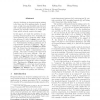Free Online Productivity Tools
i2Speak
i2Symbol
i2OCR
iTex2Img
iWeb2Print
iWeb2Shot
i2Type
iPdf2Split
iPdf2Merge
i2Bopomofo
i2Arabic
i2Style
i2Image
i2PDF
iLatex2Rtf
Sci2ools
109
click to vote
VLDB
2005
ACM
2005
ACM
Mining Compressed Frequent-Pattern Sets
A major challenge in frequent-pattern mining is the sheer size of its mining results. In many cases, a high min sup threshold may discover only commonsense patterns but a low one may generate an explosive number of output patterns, which severely restricts its usage. In this paper, we study the problem of compressing frequent-pattern sets. Typically, frequent patterns can be clustered with a tightness measure δ (called δ-cluster), and a representative pattern can be selected for each cluster. Unfortunately, finding a minimum set of representative patterns is NP-Hard. We develop two greedy methods, RPglobal and RPlocal. The former has the guaranteed compression bound but higher computational complexity. The latter sacrifices the theoretical bounds but is far more efficient. Our performance study shows that the compression quality using RPlocal is very close to RPglobal, and both can reduce the number of closed frequent patterns by almost two orders of magnitude. Furthermore, RPloca...
Related Content
| Added | 28 Jun 2010 |
| Updated | 28 Jun 2010 |
| Type | Conference |
| Year | 2005 |
| Where | VLDB |
| Authors | Dong Xin, Jiawei Han, Xifeng Yan, Hong Cheng |
Comments (0)

